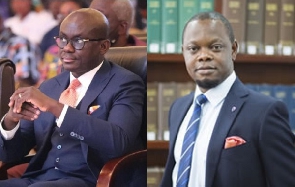 Godfred Dame (left), Justice Srem-Sai (right)
Godfred Dame (left), Justice Srem-Sai (right)
Renowned legal practitioner, Justice Srem-Sai, has refuted an assertion by the Attorney General and Minister for Justice, Godfred Dame, that criticism of the actions of his office puts pressure on state attorneys and amounts to interference.
In a statement shared on Facebook, the lawyer said that if anybody is putting state attorneys under pressure, then it is the Attorney General himself, or “his boss”.
He added that Godfred Dame is the one who determines the cases his office should prosecute, and if anyone is putting pressure on his staff, it is him and not Ghanaians who are criticizing his work.
“It is a departure from the law, and an irreverent affront to ordinary observation, for the A-G to suggest, as he has done, that his decision to prefer a charge against a person is made on the strength of evidence alone.
“Indeed, State Attorneys and the courts are under pressure in this case. However, it is more accurate to say that the pressure comes from the exercise of the A-G’s prosecutorial discretion and, perhaps, his boss’ commentaries.
“Certainly, we need to see our A-G take some responsibility for his behaviour and exercise of his prosecutorial discretion; and not hide behind his members of staff who act merely under his direct instruction in these matters,” he wrote.
Background
The Office of the Attorney General and Minister for Justice reacted to public criticisms against the state over ongoing criminal trials including that of the Member of Parliament-elect for Assin North, James Gyakye Quayson.
According to the office, the comments and pleas being made by some Ghanaians are putting unnecessary pressure on state prosecutors, who are simply doing their job of prosecuting crimes committed in Ghana.
A statement issued by the sector minister, Godfred Yeboah Dame, on Tuesday, July 4, 2023, added that Ghanaians should be mindful of the comments because nobody is above the laws of the country.
“The Attorney-General respectfully reminds Ghanaians of the principle of the equality of all persons before the law enshrined in Article 17(1) of the Constitution. No person living in Ghana, citizen or non-citizen, is above the laws of Ghana or immune from an application of same.
“The Attorney-General’s constitutional responsibility for the “initiation and conduct of all prosecutions of criminal offences” implies a duty to prosecute a crime committed in Ghana, after proper investigations have been conducted, irrespective of the political, race, colour, ethnic, religion, economic or social status of the culprit.
“State Attorneys assisting the Attorney-General in the performance of this hallowed constitutional mandate, operate under extreme pressure and are 2 exposed to severe risks. They have the right to prosecute cases freely in a court of law just as private legal practitioners enjoy a right to defend their clients, free from abuse and attacks on their character,” parts of the statement read.
It also said that the ‘high profile cases’ the state is prosecuting are not based on political affiliation or, social and economic standing but “on the strength of evidence subject to the scrutiny of the courts”.
The AG’s statement comes on the back of appeals by some notable Ghanaians including the former Attorney General and Minister of Justice, Ayikoi Otoo, and the Dormaahene, Osagyefo Oseadeeyo Agyemang Badu II, for the state to drop its case against Gyakye Quayson.
Read Justice Srem-Sai’s statement below:
Criticising the Attorney-General’s decision to commence, stop, or complete a criminal prosecution is not interference with the administration of justice or interference with the courts’ processes. This is why:
According to the known law, criminal prosecution is, primarily, at the “will and pleasure” of the Attorney-General. This is known, technically, in the common law world as “prosecutorial discretion”.
Even though the A-G’s discretion to commence, stop, re-start, or complete a prosecution may, in theory, be subject to review by the courts, we’re yet to see a court interfere with such prosecutorial discretion in Ghana.
What this tells us, perhaps, is that the reputation of the criminal justice system and the people’s trust in it can depend, quite considerably, on the behaviour of the person who, for the time being, occupies the office of the A-G.
It is a departure from the law, and an irreverent affront to ordinary observation, for the A-G to suggest, as he has done, that his decision to prefer a charge against a person is made on the strength of evidence alone.
Indeed, State Attorneys and the courts are under pressure in this case. However, it is more accurate to say that the pressure comes from the exercise of the A-G’s prosecutorial discretion and, perhaps, his boss’ commentaries.
Certainly, we need to see our A-G take some responsibility for his behaviour and exercise of his prosecutorial discretion; and not hide behind his members of staff who act merely under his direct instruction in these matters.
BAI//OGB
You can also watch this episode of People & Places here:
